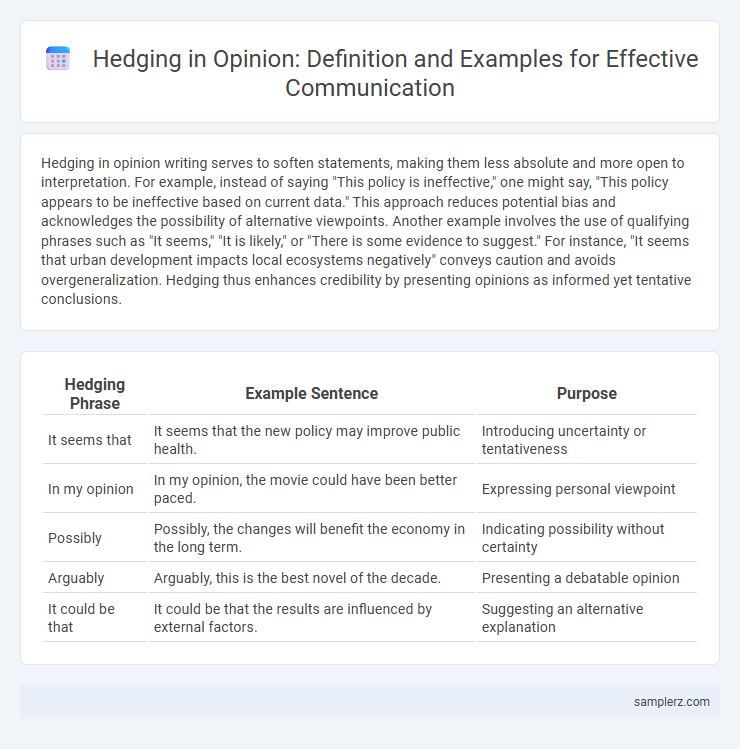Hedging in opinion writing serves to soften statements, making them less absolute and more open to interpretation. For example, instead of saying "This policy is ineffective," one might say, "This policy appears to be ineffective based on current data." This approach reduces potential bias and acknowledges the possibility of alternative viewpoints. Another example involves the use of qualifying phrases such as "It seems," "It is likely," or "There is some evidence to suggest." For instance, "It seems that urban development impacts local ecosystems negatively" conveys caution and avoids overgeneralization. Hedging thus enhances credibility by presenting opinions as informed yet tentative conclusions.
Table of Comparison
| Hedging Phrase | Example Sentence | Purpose |
|---|---|---|
| It seems that | It seems that the new policy may improve public health. | Introducing uncertainty or tentativeness |
| In my opinion | In my opinion, the movie could have been better paced. | Expressing personal viewpoint |
| Possibly | Possibly, the changes will benefit the economy in the long term. | Indicating possibility without certainty |
| Arguably | Arguably, this is the best novel of the decade. | Presenting a debatable opinion |
| It could be that | It could be that the results are influenced by external factors. | Suggesting an alternative explanation |
Understanding Hedging in Opinion Writing
Hedging in opinion writing involves using cautious language such as "it seems," "possibly," or "might" to soften statements and avoid absolute claims. This technique allows writers to present their viewpoints while acknowledging uncertainty or alternative perspectives, enhancing the credibility and balance of their arguments. Understanding hedging is crucial for effective opinion writing as it helps maintain a respectful tone and encourages open dialogue.
Common Hedging Phrases in Opinions
Common hedging phrases in opinions include expressions like "it seems that," "possibly," and "there is a chance that," which soften statements and acknowledge uncertainty. These phrases help writers present viewpoints without asserting absolute certainty, allowing room for alternative interpretations. Using modal verbs such as "might," "could," and "may" further exemplifies hedging by indicating potential rather than definitive outcomes.
Why Hedging Matters in Presenting Opinions
Hedging matters in presenting opinions because it allows speakers to express viewpoints cautiously, reducing the risk of appearing overly assertive or confrontational. Phrases like "It seems that" or "I could be wrong, but" create space for dialogue and acknowledge alternative perspectives. This strategic ambiguity fosters open communication and encourages mutual respect in discussions.
Examples of Hedging in Editorials
Editorials frequently use hedging to present opinions cautiously, exemplified by phrases like "it seems that," "possibly," or "could be interpreted as." Such hedging allows writers to acknowledge alternative viewpoints while expressing their stance, minimizing the risk of alienating readers. This technique is common in politically sensitive topics, climate change discussions, and controversial policy debates to maintain persuasive yet balanced arguments.
Subtlety in Expression: Hedging Techniques
Hedging techniques in opinion writing enhance subtlety by using words like "possibly," "might," or "could," which soften claims and invite interpretation. Phrases such as "it seems that" or "there appears to be" introduce uncertainty without undermining the overall argument. This approach allows authors to present viewpoints cautiously, balancing conviction with openness to alternative perspectives.
Impact of Hedging on Reader Perception
Hedging in opinion writing, such as using phrases like "it seems" or "possibly," softens statements and reduces perceived bias, making arguments appear more balanced. This technique increases reader trust by presenting ideas as considered perspectives rather than absolute facts. Consequently, hedging positively impacts reader perception by fostering openness and critical engagement with the content.
Comparing Direct vs. Hedged Opinions
Direct opinions assert clear stances, such as "This policy is ineffective," providing unequivocal evaluations. Hedged opinions mitigate certainty by using phrases like "It seems this policy may be less effective," allowing room for uncertainty and alternative interpretations. Comparing both highlights how hedging softens assertions, fostering diplomatic discourse while direct opinions deliver strong, unambiguous messages.
Academic Opinion: Hedging for Caution
Academic opinion often employs hedging language such as "suggests," "appears to," or "may indicate" to present arguments with caution and avoid overgeneralization. This linguistic strategy enhances credibility by acknowledging limitations and the potential for alternative interpretations. Hedging ensures that scholarly claims remain tentative and open to further evidence or debate.
The Role of Modality in Hedging Opinions
Modality plays a crucial role in hedging opinions by allowing speakers to express uncertainty or politeness, using modal verbs like "might," "could," and "would." This linguistic strategy softens statements and provides room for alternative perspectives, reducing the risk of outright disagreement or confrontation. Effective use of modality enhances communication by balancing conviction with openness, especially in subjective or contentious discussions.
How Hedging Adds Nuance to Viewpoints
Hedging in opinion writing introduces subtlety by acknowledging uncertainty and avoiding absolute statements, which enhances credibility and invites open dialogue. Phrases like "it seems," "possibly," or "arguably" allow authors to present viewpoints with measured confidence, reflecting the complexity of issues such as climate change or economic policy. This nuanced approach prevents alienation of readers with differing perspectives and fosters critical thinking by highlighting that opinions are not definitive truths.

example of hedging in opinion Infographic
 samplerz.com
samplerz.com